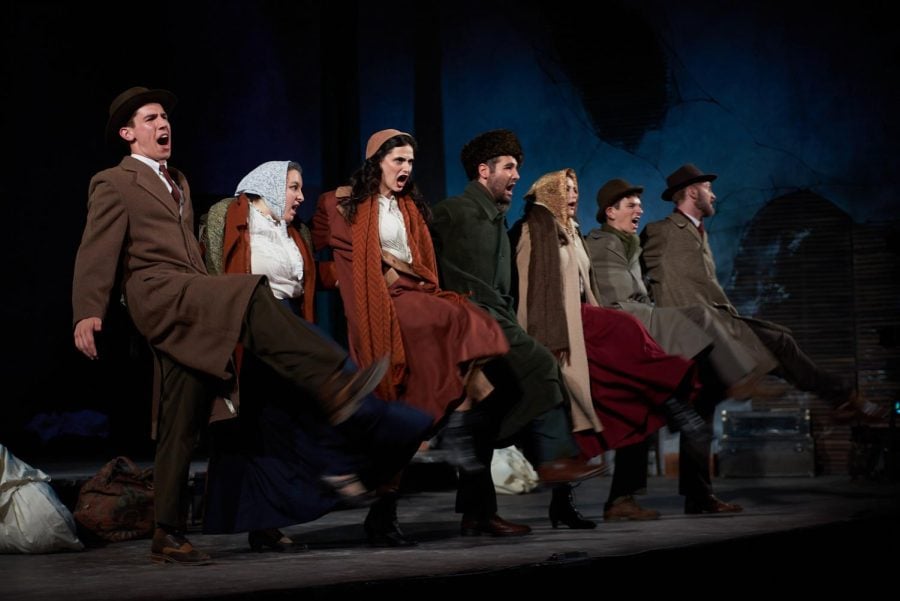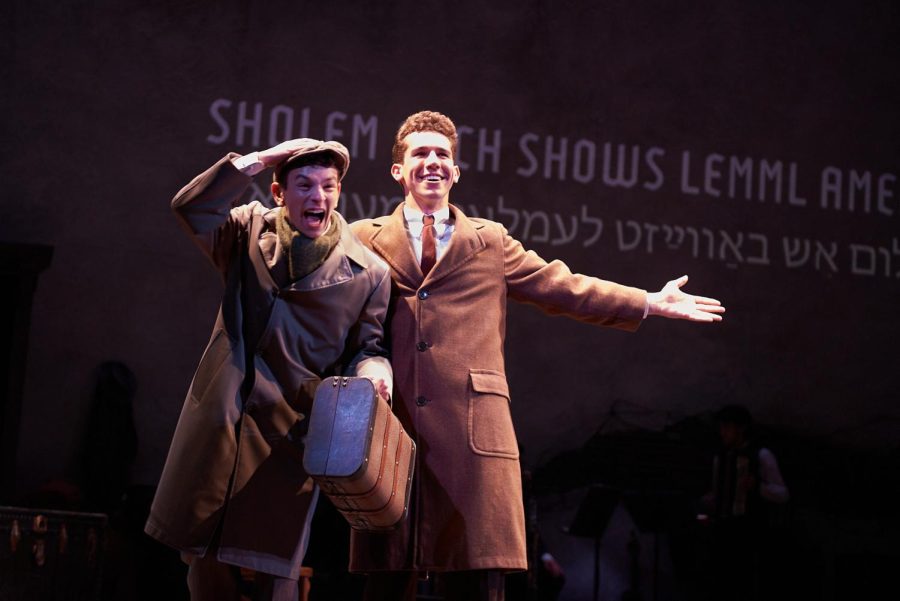‘Indecent’ brings true story of antisemitism, Jewish theatre and the value of community to Wirtz
Elisa Huang/The Daily Northwestern
The Virginia Wadsworth Wirtz Center for the Performing Arts’ production of “Indecent” will have seven performances between April 21-30 at the Josephine Louis Theater.
April 21, 2023
In February 1923, Polish-Jewish playwright Sholem Asch’s controversial Yiddish play “God of Vengeance” opened on Broadway, attracting criticism for portraying prostitution, queer relationships and Jewish culture onstage. Two weeks later, the show’s entire cast was arrested on charges of obscenity.
Now, a century later, the Virginia Wadsworth Wirtz Center for the Performing Arts is staging a production of “Indecent,” a 2015 play by Pulitzer Prize winner Paula Vogel inspired by Asch’s life and legacy. Northwestern students involved in the production say the story has never been more timely due to a rise in antisemitism and other forms of hate in America.
With seven performances between April 21 and April 30 at the Josephine Louis Theater, the play incorporates music and movement to tell the story behind the scenes of “God of Vengeance” and its impact on the cast and the world at large. The plot unfolds over four and a half decades and explores the ramifications of antisemitism, both in the United States and in Europe during the Holocaust.
Communication senior Andy Hartman, who portrays Asch, among other roles, said the production comes with heightened expectations since “Indecent” is inspired by true events. He said this play is the “most difficult show” he’s ever had to perform in.
“There was more pressure to feel like you’re portraying a real-life person because you really want to honor that lived experience, and because a lot of people don’t know about Sholem Asch, his life and his work,” Hartman said.
The historical weight of the play tackles themes of bigotry and trauma, and the dramatic range and versatility required by the script make it challenging to perform in, Hartman and other cast members said.
Aside from the lead role of Lemml, portrayed by Weinberg senior Samuel Rosner, all other members of the seven-person cast shift between various personas throughout the play.
“We all play multiple roles, which actually was something that drew me to the show and is also one of the biggest challenges of the show,” said Communication senior Gabrielle Bieder, who is a cast member. “Because you’re snapping from one role to the other, and also you’re snapping from a comedic scene to a very deep scene.”
The character changes can be a physical and mental shock, and it takes a long time for the actors to debrief after performing each show, Bieder added. She and Hartman both emphasized the need to “check out” after rehearsals due to the play’s emotional weight.
Bieder said the story requires the cast to separate themselves from the material, but also invites them to incorporate elements of their own identities into their performances.
“As actors, they say you’re playing a character, you’re getting out of it, you’re escaping your world,” said Bieder, who plays a role originally portrayed by NU alum Katrina Lenk (Bienen ’97). “But for this, it’s actually important that we understand the context and we can have our own selves to lean on.”
Bieder added that the majority Jewish cast brings their own heritage to the stage every night, not only metaphorically, but also literally.
Costume designer Lia Wallfish, a third-year MFA costume design candidate, consulted with each cast member to design personalized Jewish prayer shawls the characters wear onstage. Bieder’s shawl, for example, features the names of her relatives who fled the Holocaust.
Director Kelsey Leigh Ervi, who is pursuing their MFA in directing, said despite the play’s darker undertones, it is ultimately a celebration of community and joy.
“Although there is a layer of sadness, a layer of grief that exists — particularly near the end of the play — I think what we’re trying to do is infuse some hope at the end,” Ervi said. “The playwright Paula Vogel has given that to us, and now it’s our task to really bring it to life.’
Ervi added that they have approached the play through a queer lens, and while the cast brings a Jewish perspective, the show has themes audience members of all identities can relate to.
“We’re sadly in this moment of this rise in antisemitism across the country and also a rise in homophobia and transphobia,” Ervi said. “As a play that very much deals with Jewish themes and queer themes, themes of an immigrant story and the story of an artist, it really has entry points for a lot of different people.”
Email: jacobwendler2025@u.northwestern.edu
Twitter: @jacob_wendler
Related Stories:




